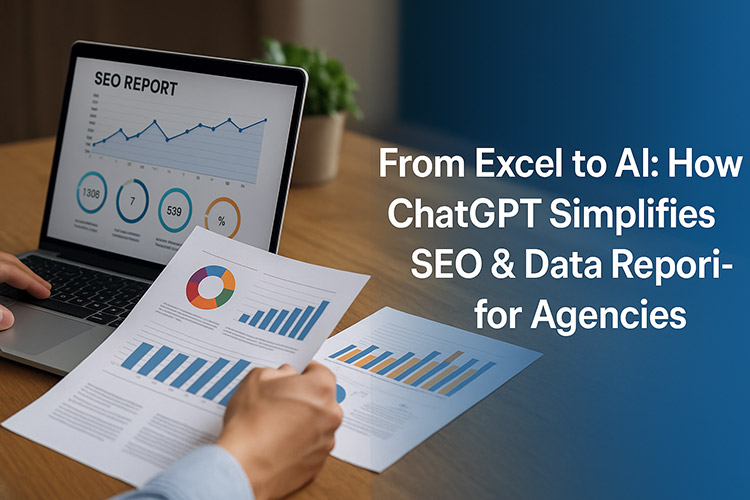Introduction: The Evolution of SEO Reporting
For years, digital marketing agencies have relied heavily on Excel sheets to manage and present SEO data. From keyword rankings and backlink profiles to traffic metrics and on-page performance, manual reporting was the norm. However, with the increasing demand for faster turnarounds and more actionable insights, the game has changed. Enter ChatGPT—an AI-powered tool that’s not just reshaping how data is handled, but redefining how it’s interpreted and communicated. This shift from static spreadsheets to dynamic AI-driven reporting marks a pivotal moment in the evolution of SEO workflows.
Challenges with Traditional Excel-Based Reporting
While Excel remains a robust tool for basic data management, it’s not built for agility. Agencies spend countless hours pulling data from multiple sources, formatting sheets, and writing summaries manually. This process is not only time-consuming but also prone to human error. More importantly, clients often struggle to make sense of raw numbers, charts, and tables that lack narrative context. For growing agencies handling multiple projects, this traditional reporting method becomes a bottleneck, slowing down productivity and limiting the ability to deliver timely, strategic insights.
The Rise of AI in Digital Marketing
The rise of AI in marketing has been nothing short of revolutionary. From predictive analytics to customer segmentation and chatbots, artificial intelligence has made its mark. But perhaps one of the most impactful innovations is the use of AI for SEO, particularly in automating and improving the quality of SEO reporting. AI doesn’t just gather data; it understands and explains it. This development opens new doors for digital marketing agencies, allowing them to replace repetitive tasks with intelligent automation that adds real value to their client services.
ChatGPT SEO Reports: A Game Changer for Agencies
At the heart of this transformation is ChatGPT SEO reports—intuitive, insightful, and easy to understand. ChatGPT takes raw SEO data and turns it into client-ready summaries that explain not just what happened, but why. Whether it’s identifying a dip in organic traffic or highlighting a rise in keyword rankings, ChatGPT generates concise narratives that are tailored to the client’s goals and industry context. The result? Reports that clients read, understand, and appreciate, while saving agency teams hours every week.
Real-Time Insights and Data Interpretation
Unlike static tools, ChatGPT works in real time. It can analyze the latest keyword data, traffic trends, bounce rates, and more, then provide meaningful context. For example, if a page’s ranking drops, ChatGPT can suggest possible reasons like increased competition, poor internal linking, or outdated content. These AI-driven explanations empower agencies to take immediate action. By offering real-time insights instead of reactive reporting, ChatGPT helps agencies shift from being data collectors to strategic advisors.
How ChatGPT Complements Digital Marketing Reporting Tools
Most agencies use a suite of digital marketing reporting tools—from Google Analytics and Ahrefs to SEMrush and Search Console. While these platforms offer robust data, interpreting that data and communicating it effectively is a different challenge altogether. That’s where ChatGPT bridges the gap. By integrating outputs from various tools, ChatGPT compiles them into a single, cohesive narrative. This hybrid approach—leveraging traditional tools for raw data and ChatGPT for interpretation—results in smarter, more efficient reporting cycles.
Benefits Beyond Reporting: Strategy and Client Communication
The value of ChatGPT extends beyond SEO reports. It assists in drafting campaign summaries, proposing next steps, and even writing performance reviews—all in the tone and structure that aligns with an agency’s brand. For example, if traffic to a blog post rises sharply, ChatGPT can help suggest related topics or expansion opportunities. It not only reports outcomes but helps strategize future actions. This positions agencies not just as executors, but as forward-thinking partners in their clients’ growth journeys.
Implementing ChatGPT in Your Agency Workflow
Integrating ChatGPT into your reporting workflow doesn’t require an overhaul. Most agencies start by using it to summarize data sets, generate monthly review templates, or draft executive summaries. Over time, it becomes a core part of the daily process—freeing up team members from repetitive writing and allowing them to focus on more creative or analytical tasks. Agencies can even customize ChatGPT’s outputs to match their voice, brand tone, or reporting format, making implementation smooth and scalable.
Best Practices for Using AI for SEO Reporting
To maximize the impact of AI for SEO, agencies should follow a few best practices:
- Cross-verify data: Use ChatGPT in conjunction with trusted SEO tools for accurate input.
- Customize outputs: Tailor reports for each client’s industry, tone, and marketing goals.
- Incorporate visuals: Pair ChatGPT-written summaries with graphs and charts for a complete experience.
- Automate smartly: Use AI where it adds value—summaries, trend analysis, and suggestions—not for fluff or filler.
- Keep humans in the loop: AI enhances, but doesn’t replace, the marketer’s expertise. Use it to strengthen—not shortcut—client strategy.
Smarter Data, Smarter Decisions
As the digital marketing industry grows more data-driven, the ability to turn raw information into meaningful action becomes a key competitive advantage. ChatGPT offers that advantage by delivering clear, fast, and insightful reporting, without the heavy manual workload. By replacing outdated spreadsheets with AI-powered narratives, agencies are not only improving efficiency but also enhancing the quality of their services. In a world where speed and clarity matter, adopting ChatGPT isn’t just smart—it’s essential.









